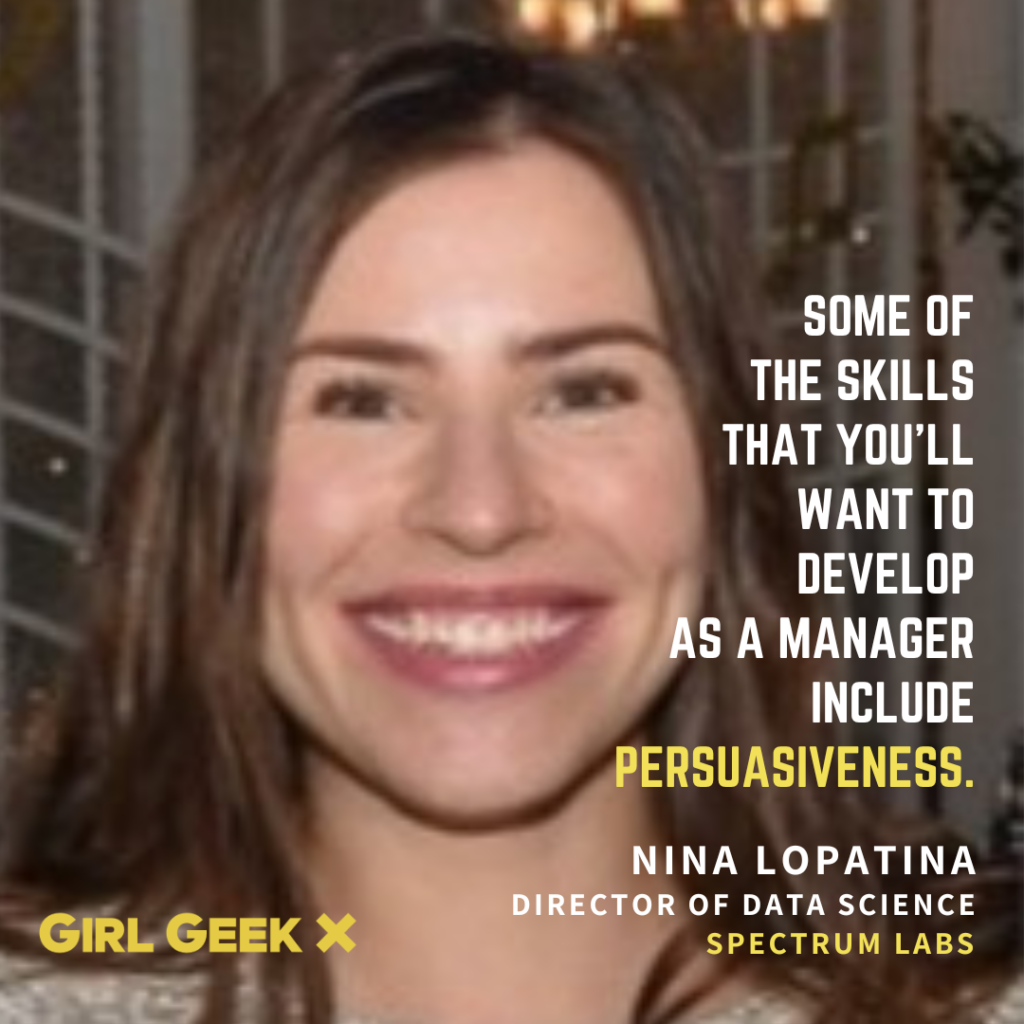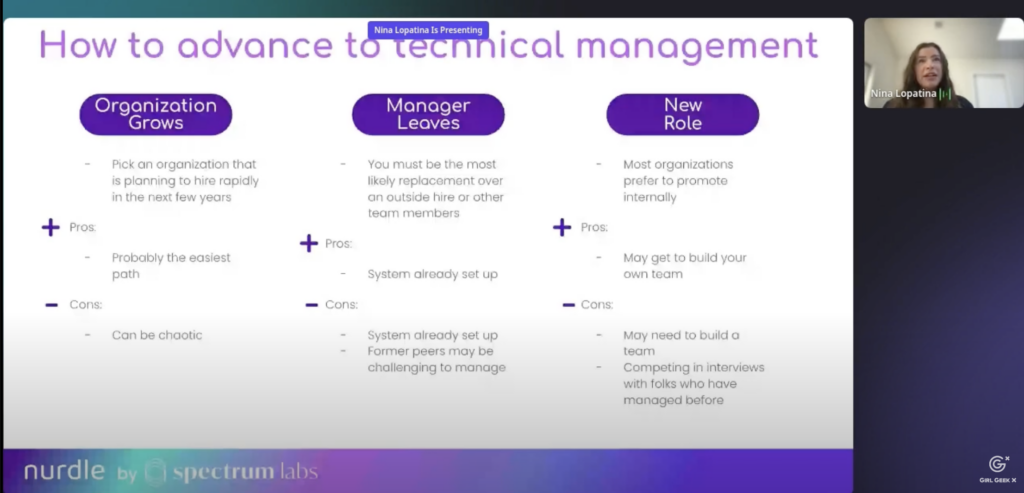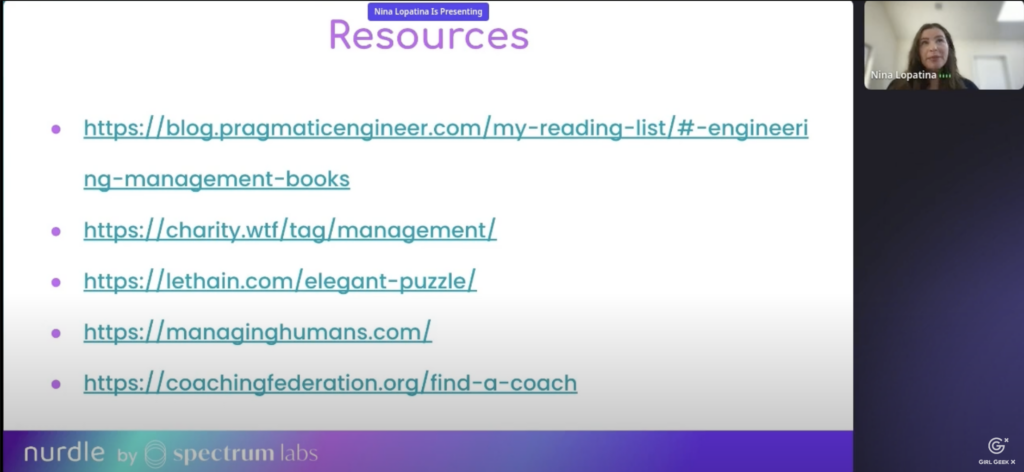VIDEO
Nina Lopatina (Director of Data Science at Spectrum Labs) shares the skills you need to advance in your career, whether it’s in your current org or interviewing elsewhere (and how to interview).
Like what you see here? Our mission-aligned Girl Geek X partners are hiring!
- Check out open jobs at our trusted partner companies.
- Watch all ELEVATE 2023 conference video replays!
- Does your company want to sponsor a Girl Geek Dinner or Career Fair? Talk to us!

Sukrutha Bhadouria: Nina is the director of data science at Spectrum Labs and she’s going to be giving us an amazing talk today about how to reach your first technical management position. Welcome, Nina.
Nina Lopatina: Thanks Sukrutha, and thanks for hosting such a great event for so many people. This talk is aimed a bit at folks that are more senior and considering switching to a management track from an individual contributor track.
Nina Lopatina: I’ll start with a little bit of background about how I did so myself. I started as a data scientist at In-Q-Tel in 2018, and after about a year and a half I was promoted to a senior data scientist. And then my manager at the time left, so then I interviewed for his role and then I was the director of data science there and then the VP. And then after several years at In-Q-Tel, I interviewed at Spectrum Labs and I started there about a year and a half ago as a director of data science.
Nina Lopatina: I should mention this talk kind uses a lot of my insight from the data science, but I’ve talked to a few folks in other areas of engineering to help broaden the perspective. I myself have a little bit of a non-traditional background in data science. I started in neuroscience, and after obtaining a PhD switched to data science because that was more fun.
Nina Lopatina: We’ll talk through the pros and cons of a management position, the skills that you’ll want to develop, how you’ll want to advance to get to that position. There’s a few different tracks. Some tips for interviewing and then some resources that you can read to learn more.
Nina Lopatina: This is a question that you really have to ask yourself: if this is something that you really want? I think it sounds a lot more alluring than it ends up being. And this is what everyone told me before I started to interview and it’s kind of something that you’ll hear from everyone. Some positives are you have this broader impact, you can impact the career of several people, which is really rewarding. Writing a recommendation letter for an intern that then gets into a fabulous PhD program is really fulfilling. But yeah, that’s a great pro. And then you’ll have more insight into how the decisions are made and possibly more money. I think it’ll pay more than the previous position you had, but if you had stayed in an individual contributor track, that can be more lucrative.
Nina Lopatina: Some things that I would say are neutral depending on your personality is that you’re going to be exercising and developing very different skills than you were as a technical individual contributor. You’ll definitely be spending more time on group dynamics and in meetings. I personally really like to interact with people, so that’s all been great for me. But there are some downsides that go along with that. For example, your technical skills can become stale. It can be really difficult to develop some of these new skills, like persuasion and collaboration. I think they may come more naturally to some folks than others.
Nina Lopatina: I would say, at least in my experience for the first one or two years, you might be pretty bad at this compared to how you were doing at your previous role in order to get promoted to a management position. Then there are definitely much fewer positions available. And then a frustrated or challenging team member, I found more challenging than any individual contributor work. This is fairly common within tech where I think there was a speed of promotion that, especially in previous years, folks that used to, and now there could be a lot of times when someone might think that there should be promoted next, but there really isn’t space because of the organizational changes that have been happening throughout tech.
Nina Lopatina: I’ll just say as a woman, since I’m speaking to an audience of mostly women, but this can include challenging gender dynamics. For example, if you’re managing a team of all men, this can just be a little bit different. Even the most well-intentioned group and organization can have some sort of biases or behaviors that they can be a little bit difficult to work with.
Nina Lopatina: Some of the skills that you’ll want to develop are persuasiveness. You’re really not telling people what to do, you’re persuading them that what you are suggesting, that maybe someone else suggested is the right path. I say over-communication rather than communication, because there are so many times when you think everything is going smoothly and you just ask a few people a few extra questions and you realize that you’re about to miss a deadline.
Nina Lopatina: As a manager, your role is really to make sure that everything is getting completed in the timeline that was promised. It’s surprising how often just asking a little bit of a deeper question can unroot a potential upcoming blocker or something.
Nina Lopatina: Diplomacy is very important. You’re working with people now instead of software or data, and it really helps to get to know how other folks around you work as well as organizational awareness. Knowing really, I mean fundamentally as a manager, someone on your team will come to you and say, “Hey, I need to do this, or I need this access to this resource,” and you need to know, okay, talk to someone on platform, talk to HR about this. There’s that level of organizational awareness, but then also knowing what the unspoken roles of different people in the organization are. This will be a lot broader than maybe what you might’ve known as an individual contributor.
Nina Lopatina: Conflict resolution is very important, either working on conflicts within your team members or disagreements with your peers about some direction setting, or between yourself and your own manager if you’re kind of reading something from your team members that you think is really important.
Nina Lopatina: And then context switching is something that I find myself doing a lot more often where you’re back to back meetings, maybe you’re talking about one project, 30 minutes later you’re talking about another project, 30 minutes later is something else. It’s a lot more context switching, which I think my record as a neuroscientist I know is not really great for anyone, but I think it’s something that can be managed. And then foresight, really thinking ahead as you’re deciding how to allocate resources or staffing folks on different projects, you want to be able to think through how this will impact their career, the project work, the dynamics between the teams, things like that.
Nina Lopatina: I personally found it really helpful to be organized, because it really helps keep up with all the follow-up and tracking everything. And just having a really good system that you have. Recently I just saw a tweet that really brought together some of these different skills. 91.4% of the dumb things big companies do are because two VPs who should be collaborating are locked in a power struggle. This is the risk if you don’t develop some of these skills.

Nina Lopatina: I see three different paths to advance. One would be if the organization grows. That would mean you’d have to join an organization that you know is planning to hire rapidly in the next few years, particularly in the area that you’re working in. This is probably the easiest path because as it grows, someone who’s more senior will end up leading the team that’s going to get added. But I’ve heard this can be a little bit chaotic as, with a lot of growth, there can be a lot of growing pains as well.
Nina Lopatina: Another path, I guess one of the paths I took was my manager left. Now this is not really up to you, it’s just people leave jobs every once in a while. If this does happen, then you have to be the most likely replacement over an outside hire or other team members. And one of the pros is that there’s already a system set up for everything for how to manage folks and how projects are already probably in flight.
Nina Lopatina: One of the cons is that the system is already set up. So I think every manager is different. Processes that work for one person might not work for another and the team members may not be as willing to have so many things change at once, especially if the manager that departed was well liked. And then former peers may be challenging to manage. Then interviewing for a new role. I also know folks that have gone through all of these paths, and I kind of went this route as well even though I had previously managed when I was interviewing.
Nina Lopatina: Because I’d only managed for about a year and a half, that really actually doesn’t count for managing for that long. When I was interviewing, I found that most organizations prefer to promote internally rather than hiring a manager. That’s one challenge, although I definitely know a number of folks who have gone this route. For example, if you specialize in something really valuable in your organization and another organization wants to grow a team in that area, then it would make sense to hire you and have you develop that team.
Nina Lopatina: One of the pros is that you may get to build your own team. If you think you have a strong knack for hiring people that will have complimentary skills and get along well, then this is great. But one of the cons is that you may need to build a team, and this takes a really long time. Hiring is challenging. And when you’re interviewing folks, you don’t really know what you’re going to get when they join. And that can take some time to learn as well. And then you’ll be competing in interviews with folks who have managed before. So that can be a challenge as well.
Nina Lopatina: Before I get to the interview tips, I’ll share a few application tips. I would say these are pretty general, not just management positions but elsewhere. But generally I would reach out to folks that I already knew at organizations where they were hiring so that I would have an internal referral. Because otherwise, a lot of times your resume could just get lost in a bin.
Nina Lopatina: A great way to meet people is to go to events like this one and other, depending on where you are. If you’re in the Bay Area, there’s tons of tech events happening all the time. And just continuing to grow your network, keeping in touch with people that you know in your same domain.
Nina Lopatina: And then I think just having your resume, then highlight whatever leadership that you’ve had. And then if it’s an internal promotion, you may have to interview. I had to interview within In-Q-Tel when I was moving from senior data scientist to director. I don’t think I needed a resume, but then the interview process was pretty similar. The interview, depending on the organization. For example at Google, they would do a full technical interview with one leadership session. And then some other organizations might have it be half-and-half, startups might tend to have half of it be a technical interview and half focused on leadership since the role will still likely be partially an individual contributor, so they’ll want to look at both of those skills.
Nina Lopatina: I really recommend practicing with a friend or a coach. I did both. And then it also helps to know the tech stack already. Really knowing a lot of the pipeline that they’re using will really help, especially how you’ll be likely offered a start as an individual contributor with a near term move to management. I saw this a lot and I’ve heard it’s pretty common. If you know the technical stack already, that will really help.
Nina Lopatina: I would say when I was interviewing, I think what folks looked for the most was seeing if I’d be someone who would be easy to work with. Not the tweet I showed earlier about folks that would get locked into a power struggle. I think conveying that during the interview portions that are about how you collaborate with people is also really important.

Nina Lopatina: These are a few resources I found to be helpful. These are basically going to be books about engineering management or blogs. Those would kind of give you a sense of what the role is like and also would help you hone in on which skills to practice, especially if you are trying to do this from an individual contributor role and you may not have a chance to practice some of those skills, then at least reading about them would give you further insight. One of these is a reading list of engineering management books from the Pragmatic Engineer blog. It’s a blog by Gergely Orosz, who I follow on Twitter who tweets lots of interesting things about tech in general.
Nina Lopatina: Also management, Charity.wtf has a series of blogs. She’s a former engineering manager at Facebook who has her own startup now. And then she blogs about a number of different things. And then all of her blogs on management are also definitely very interesting to read. And some of these may be a little bit more specific to different areas of engineering, but some of them kind of generalized pretty well.
Nina Lopatina: A couple of books that I haven’t read, but a couple of my colleagues recommended that are probably on this reading list here are Elegant Puzzle in Managing Humans. And then a coach that I worked with pointed me to this coaching federation, Find a Coach site. I found this really helpful as I was trying to figure out my next steps career-wise. It helps to be able to envision your whole life when you’re in this position and seeing how it fits with other responsibilities like family and kids and stuff. Because that’s just a very real consideration that many of us might face. And thinking about what you really excel at and things like that. I really recommend taking some time to go through that kind of process and really thinking it through.
Nina Lopatina: Then in summary, talked about the pros and cons of a technical management position and then the skills that you might want to develop, the three different paths to advance, an organization growing, your manager leaving, or interviewing someone new. And then a few tips for how you’ll interview and a few resources that would help in the process.
Sukrutha Bhadouria: And everybody who has commented here really likes the content that you shared and is feeling inspired. So thank you for sharing that.
Nina Lopatina: Sounds great. Thank you for having me.
Like what you see here? Our mission-aligned Girl Geek X partners are hiring!
- Check out open jobs at our trusted partner companies.
- Watch all ELEVATE 2023 conference video replays!
- Does your company want to sponsor a Girl Geek Dinner or Career Fair? Talk to us!


